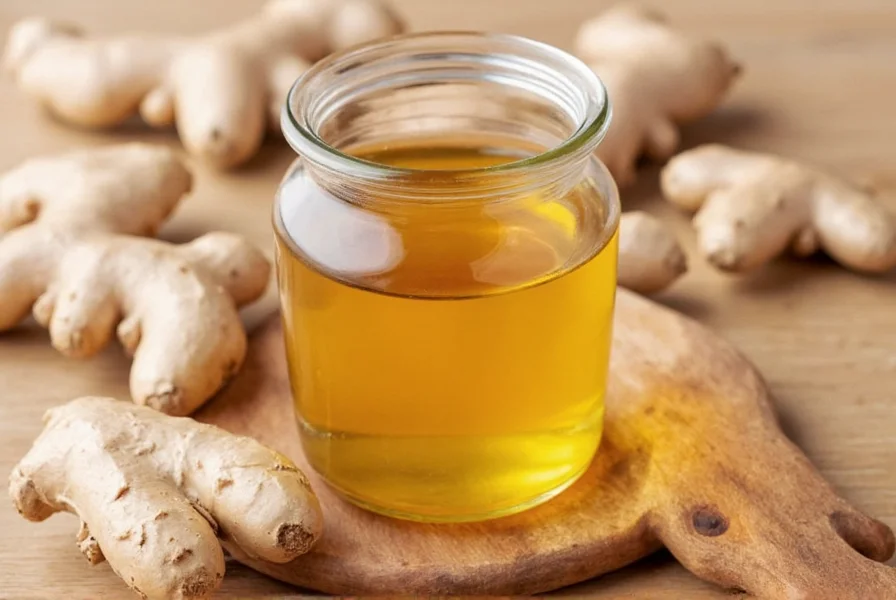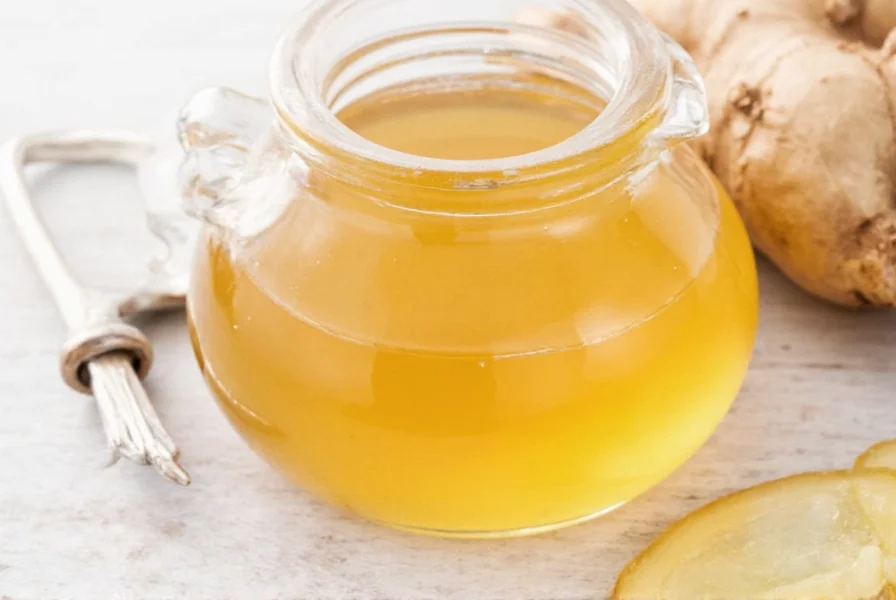Ginger syrup represents one of the most adaptable natural preparations you can create in your kitchen. This simple blend of ginger, sugar, and water transforms the pungent root into a shelf-stable ingredient with remarkable versatility. Whether you're seeking relief from seasonal discomforts or looking to elevate your culinary creations, understanding how to properly prepare and use ginger syrup provides significant value.
What Exactly Is Ginger Syrup?
Ginger syrup, sometimes called ginger cordial or ginger honey syrup when prepared with honey, is a concentrated liquid made by extracting ginger's essential compounds through a simmering process with a sweetener. The traditional preparation involves equal parts freshly grated ginger and sugar simmered with water, though variations exist across different culinary traditions.
The magic happens through osmosis and heat extraction—sugar draws out ginger's volatile oils and active compounds like gingerols while the gentle heat helps preserve these beneficial elements. Unlike ginger ale or ginger beer which contain carbonation and additional ingredients, pure ginger syrup maintains the root's authentic flavor profile without artificial additives.
Science-Backed Health Benefits of Ginger Syrup
Research supports several health benefits associated with ginger consumption, which carry through to properly prepared ginger syrup:
| Benefit | Scientific Support | Recommended Usage |
|---|---|---|
| Digestive Support | Multiple studies confirm ginger's effectiveness for nausea relief | 1-2 teaspoons in warm water before meals |
| Anti-Inflammatory Properties | Gingerols shown to reduce inflammation markers | Daily consumption as part of balanced diet |
| Respiratory Comfort | Traditional use supported by ginger's warming properties | 1 teaspoon in hot tea when experiencing discomfort |
It's important to note that while ginger syrup offers these potential benefits, it shouldn't replace medical treatment for serious conditions. The syrup's sugar content means moderation is key, especially for those monitoring blood sugar levels.
Perfect Homemade Ginger Syrup Recipe
Creating professional-quality ginger syrup requires attention to detail but remains accessible to home cooks. This tested recipe produces a balanced syrup with optimal shelf life:

Ingredients
- 1 cup freshly grated ginger root (about 4 ounces)
- 1 cup organic cane sugar
- 1 cup filtered water
- Optional: 1 cinnamon stick or 3 whole cloves for variation
Step-by-Step Preparation
- Peel and finely grate fresh ginger using a microplane for maximum extraction
- Combine all ingredients in a non-reactive saucepan
- Bring to a gentle simmer over medium heat, stirring until sugar dissolves
- Reduce heat to low and maintain a bare simmer for 20 minutes
- Cool slightly, then strain through a fine-mesh sieve, pressing ginger solids
- Pour into sterilized glass bottle and refrigerate
Pro tip: For stronger medicinal properties, extend simmering time to 30 minutes, but monitor liquid levels to prevent over-concentration. The ideal ginger syrup should coat the back of a spoon without being overly thick.
Culinary Applications Beyond Remedies
Ginger syrup's versatility extends far beyond wellness applications. Professional chefs and mixologists prize this preparation for its ability to add complex flavor to diverse dishes:
- Cocktails: Substitute simple syrup with ginger syrup in Moscow Mules, Whiskey Sours, or create signature drinks
- Baking: Brush over cakes or incorporate into glazes for gingerbread
- Breakfast: Drizzle over pancakes or mix into yogurt parfaits
- Savory Dishes: Create glazes for roasted vegetables or protein marinades
Ginger Syrup vs. Commercial Alternatives
Understanding the differences between homemade and store-bought options helps you make informed choices:
- Homemade ginger syrup contains only ginger, sugar, and water with no preservatives, offering superior flavor complexity and control over ingredient quality
- Commercial ginger syrups often include citric acid, sulfites, or artificial flavors to extend shelf life beyond 6 months
- Ginger extract provides concentrated flavor but lacks the textural element of syrup
- Ginger ale contains carbonation and additional sweeteners, making it less suitable for cooking applications
When selecting commercial products, look for those listing only ginger, sugar, and water in the ingredients. Many premium cocktail syrups now meet this standard, though they typically cost 3-4 times more than homemade versions.
Storage Guidelines and Shelf Life
Proper storage determines both safety and quality of your ginger syrup:
- Always use sterilized glass containers with tight-sealing lids
- Refrigerate immediately after cooling and use within 2-3 weeks
- Freeze in ice cube trays for longer storage (up to 6 months)
- Discard if cloudiness develops, mold appears, or aroma changes
The high sugar content acts as a natural preservative, but unlike commercial products with added preservatives, homemade versions have a more limited shelf life. For extended storage, consider making smaller batches more frequently.
Special Considerations for Different Needs
Adapting ginger syrup preparation accommodates various dietary requirements:
- For diabetics: Substitute sugar with monk fruit sweetener or reduce sugar content (though this decreases shelf life)
- Vegan preparation: Ensure sugar is certified vegan (some sugars use bone char in processing)
- Enhanced medicinal syrup: Add turmeric and black pepper during simmering for additional anti-inflammatory benefits
- Kid-friendly version: Reduce ginger quantity and increase citrus elements for milder flavor
Remember that ginger may interact with certain medications including blood thinners, so consult your healthcare provider before using ginger syrup medicinally if you take prescription medications.
Conclusion: Maximizing Ginger Syrup Benefits
Ginger syrup represents an exceptional kitchen staple that bridges culinary and wellness applications. By understanding proper preparation techniques, storage requirements, and diverse usage options, you can maximize both flavor and potential health benefits. The simplicity of homemade preparation makes it accessible to anyone seeking a natural alternative to processed ingredients while providing control over quality and purity.
How long does homemade ginger syrup last in the refrigerator?
Properly prepared and stored in a sterilized glass container, homemade ginger syrup maintains quality for 2-3 weeks in the refrigerator. Check for cloudiness, mold, or off odors before use, as these indicate spoilage. For extended storage, freeze in ice cube trays for up to 6 months.
Can I use honey instead of sugar when making ginger syrup?
Yes, you can substitute honey for sugar in a 1:1 ratio to create ginger honey syrup. However, add the honey after removing the ginger-water mixture from heat to preserve honey's beneficial enzymes. Note that honey-sweetened syrup has a slightly shorter refrigerator shelf life (about 2 weeks) compared to sugar-based versions.
What's the difference between ginger syrup and ginger shots?
Ginger syrup contains sugar and water, creating a shelf-stable sweetener with balanced flavor, while ginger shots are highly concentrated preparations of pure ginger juice, often mixed with lemon or cayenne. Syrup works well as an ingredient in recipes and beverages, whereas shots provide immediate, intense ginger benefits but require daily preparation and refrigeration.
Is ginger syrup safe for children?
Ginger syrup is generally safe for children over 2 years old in small amounts (1/4 to 1/2 teaspoon). For younger children or infants, consult a pediatrician first. When preparing for children, consider reducing the ginger quantity for milder flavor and always use it as part of a balanced approach to wellness rather than as a primary treatment.
Can I use ginger syrup as a cough remedy?
Many people find relief from occasional coughs by mixing 1-2 teaspoons of ginger syrup in warm water or tea. The syrup's soothing properties may help calm throat irritation, though it shouldn't replace medical treatment for persistent coughs. For best results, combine with lemon and honey for additional soothing effects.











 浙公网安备
33010002000092号
浙公网安备
33010002000092号 浙B2-20120091-4
浙B2-20120091-4